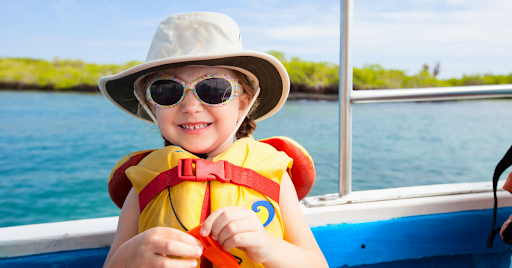4 Best Practices for Summer Safety
June 30, 2023

The summer months are often kids’ favorite. No school, spending extra time with family and friends, and not to mention all of the fun outdoor activities. It is important to remember that this fun season can also pose a danger for children. Taking steps to ensure summer safety during these fun months is of the utmost importance.
Summer Safety For Children
With temperatures in North Carolina climbing, summertime is officially here. The summer months not only bring warm weather but also a chance for families to get outdoors and be active. However, it is always important to remember summer safety practices when participating in outdoor activities. Holly Springs Pediatrics has put together a list of four of the most important summer safety practices for children.
1. Sun Protection:
The importance of sunscreen and adequate sun protection cannot be stressed enough. Sunscreen helps to protect children from sunburn, skin cancer, and premature aging of the skin. We recommend the daily use of sunscreen from early March through October. We also suggest that UV-protective clothing, hats, and sunglasses be worn when appropriate.
Even if your child has dark skin, sun protection should still be used. In fact, practicing sun safety at an early age may lessen your child’s chances of developing a sun-related condition later in life, such as melanoma. Because sunscreen is not recommended for babies who are 6 months or younger, the U.S. Food and Drug Administration suggests keeping infants out of the sun during midday or using protective clothing.
2. Practice Water Safety:
There is nothing more fun than a day at the pool, lake, or beach. However, that fun day can take a turn if water safety is not used. One of the most important summer safety tips is always to monitor your children when they are around water, even if they can swim. It only takes a second for an accident to happen, and children can drown in less than 2 inches of water. Additionally, using Coast Guard-approved floatation devices for children who are unable to swim well is recommended.
3. Drink Up:
With the heat comes a chance for dehydration. Make sure your child is getting plenty of fluids, such as water, to avoid dehydration. Your child may be so busy playing that they forget to take a drink break. Be sure to remind them of the importance of fluids. Signs of dehydration to be on the lookout for include dizziness, nausea, and lightheadedness. A good rule of thumb for preventing dehydration is if the temperature is 90° or above with high humidity, children should not play outside or exercise for more than 30 minutes at a time.
4. Break out the Bug Spray:
Not only are bug bites an inconvenience, but they can also be serious. At times, bugs can be carriers of diseases. Examples of this are ticks which can be carriers of Lymes Disease or Rocky Mountain Spotted Fever, and Mosquitoes which can carry West Nile virus. The best protection against insect bites is bug spray. Before you send your children outside to play, even if it is just in the yard, be sure to spray them with an insect repellent to lessen their chances of being a target for insects.
The summer is a great time to participate in fun activities with loved ones. By remembering these simple four tips, you can ensure a safe, happy, and healthy summer. If you have questions about the summer safety measures above, please feel free to contact our office. We take the health of our patients seriously and appreciate parental concern when it comes to safety measures. For more helpful information, schedule an appointment with one of our providers today.
